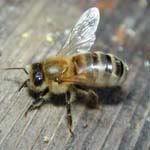How are our bee friends doing as spring comes on in a hurry?
In Britain:
In America:Beekeepers have warned that most of the country's honey bees could be wiped out by disease in 10 years unless an urgent research programme is launched to find new treatments and drugs. They are to launch a nationwide campaign, including protests, to force the government to fund the £8m research project which they say is needed to save the nation's bees.
Ministers say they have no budget for such a programme, a claim rejected by keepers, who are to lobby MPs, gather at the House of Commons for a protest meeting and begin a letter campaign to raise support for research funds.
'Beekeeping is still reeling from the varroa mite, which carries a number of viruses and which devastated thousands of hives across the country when it reached Britain 10 years ago,' said Tim Lovett, president of the British Beekeeping Association. 'Now there is a real danger that colony collapse disease - which has wiped out 80 per cent of bees in parts of the US - will appear in this country. Unless we develop effective protection, there could then be massive losses of bees across the country.'
In the United States, the honey bee problem and its ramifications have not even been discussed in any 2008 Presidential election event. All the presidential candidates promise the usual increasing bounty of new government spending oblivious to the fact that the disappearing honey bee crisis, if unresolved, may create huge food price inflation and food scarcity during their second presidential term in office.In the Corporation of Haagen-Dazs:
In the First National Beekeepers Conference in January 2008 in Sacramento, California, beekeepers complained about the lack of government action as they confront financial catastrophe. In general, United States honey bee inspection remains critically under funded, understaffed, and under appreciated.
While there still is no solution to the problem of colony collapse disorder, ongoing research into the problem is focused on three main theories - pesticides (herbicides, fungicides), mono-nutrition, and viruses. There may be just one cause of CCD or it could be a combination of several problems. The truth is that we are not near a solution to the problem of disappearing bees from their hives since a cause has yet to be clearly identified and time may be running out.
NEW YORK (CNNMoney.com) -- Haagen-Dazs is warning that a creature as small as a honeybee could become a big problem for the premium ice cream maker's business.Um ... guys?
At issue are the disappearing bee colonies in the United States, a situation that continues to mystify scientists and frighten foodmakers.
That's because, according to Haagen-Dazs, one-third of the U.S. food supply - including a variety of fruits, vegetables and even nuts - depends on pollination from bees.
If we lose the bees, we won't be just worrying about the loss of flavors of ice cream!! By that time we'll be stepping over starvation victims lying in the streets.
But nice of you to put it into perspective!
crossposted at Rants from the Rookery

No comments:
Post a Comment